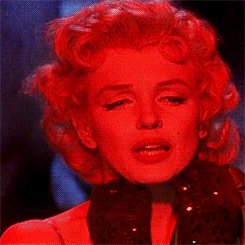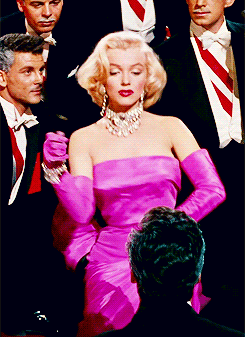1948 - Marilyn Monroe chante "How Wrong Can I Be"
How Wrong Can I Be
Composition: Fred Karger, Alex Gottlieb
Piano: Fred Karger
Trompette: Manny Klein
Chant: Marilyn Monroe
Date: fin 1948 / début 1949
Paroles
How wrong can I be,
If my heart says to me
Love like ours never dies.
How wrong can I be,
When it's sure plain to see
That a heart never lies.
> ecoutez / listen
Traduction
Comment pourrais-je me tromper,
Si mon coeur me dit
Que l'amour comme le nôtre ne meurt jamais.
Comment pourrais-je me tromper,
Quand il est évident de voir
Que le coeur ne ment jamais.
Bonus Infos
- La chanson, une ballade plaintive, aurait été enregistrée à la fin de l'année 1948, voir au début de l'année 1949. Enregistrée sur un disque d'acétate de 12 pouces, elle n'a jamais été publiée.
Accompagnée d'un piano et d'une trompette sourde, Marilyn interprète le titre dans un style flamboyant, séduisant et sensuel, avec une inflexion jazzy occasionnelle.
La chanson a été écrite par Fred Karger et Alex Gottlieb.
Elle raconte une histoire de chagrin et de regret, du point de vue d'une femme qui a mis fin à une histoire d'amour par jalousie malavisée.
The song, a plaintive ballad, would be recorded in late 1948 or early 1949. Recorded on a 12-inch acetate disk, it was never released.
Accompanied by a piano and muted trumpet, Marilyn sings the song in a torchy, seductive and sultry style with an occasional jazzy inflection.
The song was written by Mr. Karger and Alex Gottlieb
It tells a story of sorrow and regret, from the point of view of a woman who has ended a love affair out of misguided jealousy.
- La chanson a été découverte au public lors de la vente aux enchères organisée par Sotheby's (le 13 septembre 1995 à Londres), et nous n'en connaissons qu'un extrait (de 25 secondes). Le vendeur anonyme, dont le père était dans l'industrie de la musique, triait une pile d'enregistrements de son père en 1992 et en a remarqué un qui comportait une étiquette manuscrite: "Fred Karger au piano, Manny Klein à la trompette, Marilyn Monroe." Estimée à 15 000 $, l'enregistrement n'avait pas trouvé d'acheteur.
The song was discovered to the public during the sale auctions organised by Sotheby's (on September, 13, 1995, in London) and we only know one extract (25 secondes). The anonymous seller, whose father was in the music business, was sorting through a stack of his father's recordings in 1992 and noticed one with a hand-written label that read "Fred Karger at the piano, Manny Klein on the trumpet, vocal by Marilyn Monroe." Estimated at $15,000, the recording didn't found buyer. - L'extrait de la chanson figure dans le film de Guillomo Del Toro "La forme de l'eau" (2017), qui raconte l'histoire d'Elisa, agent d'entretien dans un laboratoire de Baltimore en 1962 où est retenu prisonnier un homme amphibien.
The song's extract is in the Guillomo Del Toro's movie "The Shape of Water" (2017), which tells the story of Elisa, a janitor in a laboratory in Baltimore in 1962 where is held an amphibian man as prisoner.
© All images are copyright and protected by their respective owners, assignees or others.
copyright text by GinieLand.

/image%2F1211268%2F20240315%2Fob_782fd3_banner-mm-2024-03-spring-5.jpg)
/image%2F1211268%2F20240410%2Fob_40c4f9_blog-gif-mm-niagara-1-3.gif)

/image%2F1211268%2F20240417%2Fob_0b0d56_2024-03-lee-mexique.jpg)
/https%3A%2F%2Fstorage.canalblog.com%2F19%2F65%2F312561%2F91436129_o.jpg)
/https%3A%2F%2Fstorage.canalblog.com%2F57%2F63%2F312561%2F127743382_o.jpg)
/https%3A%2F%2Fstorage.canalblog.com%2F98%2F05%2F312561%2F84823731_o.jpg)
/https%3A%2F%2Fstorage.canalblog.com%2F01%2F63%2F312561%2F84814201_o.jpg)
/https%3A%2F%2Fstorage.canalblog.com%2F66%2F21%2F312561%2F82823948_o.jpg)
/https%3A%2F%2Fstorage.canalblog.com%2F32%2F31%2F312561%2F124125043_o.jpg)
/https%3A%2F%2Fstorage.canalblog.com%2F31%2F08%2F312561%2F71448014_o.jpg)
/https%3A%2F%2Fstorage.canalblog.com%2F34%2F90%2F312561%2F81829009_o.jpg)
/https%3A%2F%2Fstorage.canalblog.com%2F18%2F35%2F312561%2F61120383_o.jpg)
/image%2F1211268%2F20240410%2Fob_9f471d_blog-gif-mm-syi-1.gif)



/http%3A%2F%2Fstorage.canalblog.com%2F76%2F10%2F312561%2F133021364_o.jpg)
/http%3A%2F%2Fstorage.canalblog.com%2F61%2F97%2F312561%2F132820718_o.jpg)
/http%3A%2F%2Fstorage.canalblog.com%2F29%2F61%2F312561%2F131834608_o.jpg)
/http%3A%2F%2Fstorage.canalblog.com%2F36%2F15%2F312561%2F129968826_o.jpg)

/image%2F1211268%2F20240229%2Fob_66f2c6_tag-mm-public-martin-lewis-show-1.png)
/image%2F1211268%2F20240410%2Fob_07cb4a_blog-gif-mm-stern-1.gif)
/image%2F1211268%2F20240229%2Fob_143453_blog-gif-video.gif)
/image%2F1211268%2F20240301%2Fob_735dec_blog-liens-culture.jpg)

/image%2F1211268%2F20240302%2Fob_e11252_blog-liens-friends-jane.gif)